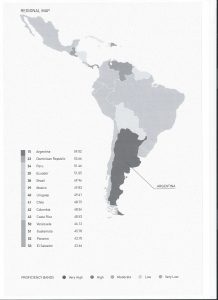‘Argentina’s score has risen by 5.53% over the past 7 years’ and is for the first time ‘classified as a high proficiency country’. Are Argentineans taking the language of Shakespeare and Global Business more seriously? Immigration and tourism may be significant factors in this change; more foreigners with English language skills are arriving in the country. ‘Export dependency is another correlate with English. Countries that export more are better at English’. [2] Argentina has always relied heavily on exports and most international business transactions are carried out in English. Teaching is most certainly an important factor in the country’s rising language skills proficiency. English is taught-though with varying degrees of expertise and resources -in all schools around the country.

How is it done? ‘The EF English Proficiency Index calculates a country’s average adult English skill level using data from two different EF English tests completed by hundreds of thousands of adults every year. There is no incentive for test takers to inflate their scores artificially on these low-stakes tests by cheating or cramming, as the results do not lead to certification or admission to a program.’ If this is indeed the case the survey does seem to add value to the study of the English language as a global tool for science, technology, education and communication. However, as the Economist points out ‘this was not a statistically controlled study: the subjects took a free test online and of their own accord. They were … connected to the internet and interested in testing their English…’. [3] The sample is probably as representative as it can at present be considering its design and methodology.
With Denmark at the top of the list-most Nordic countries are among the first five-and Austria at number 7, the results including those with ‘very’ high proficiency skills may not come as a surprise. Iraq is last at number 63, Russia 36, Germany 10, France 29 and more surprisingly, given its historical links with Britain or because of it, is Hong Kong at number 31.
English language skills have long been essential to compete in global markets. English continues to be the common language. In a 2012 survey by the Economist Intelligence Unit, ‘nearly 70% of executives said their workforce will need to master English to realise corporate expansion plans, and a quarter said that more than 50% of their total workforce will need English ability’. [4]
According to Randstad[5], world experts in Human Resources, 75% of jobs for executives require a second language, preferably English. 58.4% of more than 2.8 billion internet users are estimated to use English as the main language[6]. ebizmba.com[7] estimates that the 15 most popular internet business sites are in English. Among them: Yahoo Finance (with 50 million visits), CNN Money (49), Wall Street Journal (27), Google Finance (24), BusinessWeek, Bloomberg, Forbes, BusinessInsider, Financial Times, and CNBC. [8]
Whether we like it or not English is still ‘spoken at a useful level by a quarter of the world population’. The British Council estimates that in the next decade almost half the world population will speak English. And yes…non-native speakers far outnumber native ones at a ratio of 4:1! [9]
[2] http://www.economist.com/blogs/johnson/2011/04/english
[3] http://www.economist.com/blogs/johnson/2012/10/language-skills
[4] http://www.britishcouncil.org/sites/britishcouncil.uk2/files/english-effect-report.pdf
[6] http://www.internetworldstats.com/stats7.htm
[7] ebizmba.com
[8] Eduardo Ruiz-Healy in http://www.merca20.com/la-importancia-del-ingles/
[9] http://www.britishcouncil.org/organisation/publications/the-english-effect
EF-Report Argentina
This report may be found in English at http://media.ef.com/sitecore/__/~/media/centralefcom/epi/v4/downloads/fact-sheets/ef-epi-country-fact-sheet-v4-ar-en.pdf



